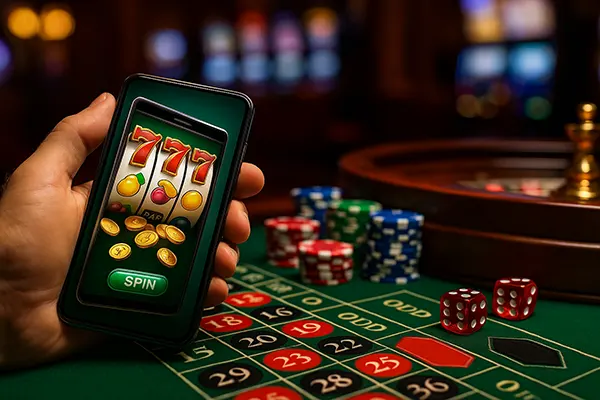
Mobile Gambling: Will Smartphones Replace Traditional Gambling Venues?
In recent years, mobile gambling has significantly transformed the gaming industry. With the advancement of technology and the increased accessibility of smartphones, more players are opting for mobile gaming rather than visiting traditional gambling venues. This shift in preference raises a critical question: will smartphones eventually replace brick-and-mortar casinos? In this article, we will explore the evolution of mobile gambling, its impact on traditional venues, and whether smartphones are set to dominate the gambling landscape.
The Rise of Mobile Gambling
Mobile gambling has experienced remarkable growth over the past decade. The introduction of robust mobile applications and high-speed internet connectivity has allowed players to access a wide range of casino games from their handheld devices. From slots to live dealer games, mobile casinos offer almost the same variety as their physical counterparts.
The convenience factor plays a significant role in this transition. Unlike traditional venues, mobile casinos are accessible from anywhere, at any time. Players no longer need to plan a trip to a casino; instead, they can enjoy gaming during their commute, at home, or even during a break at work.
Furthermore, the personalisation offered by mobile platforms enhances the user experience. Features such as tailored bonuses, push notifications, and user-friendly interfaces make mobile gambling highly appealing to modern players. As a result, mobile casinos are attracting not only seasoned gamblers but also a younger demographic who prefer gaming on the go.
Technological Innovations Driving Mobile Gambling
The success of mobile gambling is rooted in technological advancements. One of the key developments is the implementation of HTML5 technology, allowing games to be compatible with various devices without the need for downloading additional software. This has made mobile gaming more accessible and convenient.
Additionally, the rise of augmented reality (AR) and virtual reality (VR) features has further enhanced the immersive experience. Mobile casinos now offer live streaming of table games and interactive features that closely mimic the atmosphere of a physical casino.
Security improvements have also played a crucial role. Enhanced encryption and secure payment gateways provide players with the confidence to gamble online without fearing data breaches. As mobile technology continues to evolve, it is likely to address the few remaining concerns related to online safety and fair play.
The Impact on Traditional Gambling Venues
As mobile gambling continues to thrive, traditional gambling venues face new challenges. The most significant impact is a decline in foot traffic. Players who used to visit land-based casinos now opt for mobile apps, reducing the need for physical spaces dedicated to gambling.
Moreover, the operating costs of maintaining a physical casino are substantially higher compared to mobile platforms. This economic reality has forced many establishments to rethink their business strategies, often incorporating mobile apps to remain competitive in the modern landscape.
However, it is worth noting that traditional venues still hold cultural and social value. The ambiance of a physical casino, the interaction with live dealers, and the overall atmosphere are elements that mobile apps cannot fully replicate. As such, while mobile gambling is on the rise, traditional casinos continue to offer a unique, albeit niche, experience.
Hybrid Models: Merging Digital and Physical Experiences
To mitigate the impact of mobile gambling, many traditional casinos have adopted a hybrid model. This approach combines physical spaces with digital offerings, allowing players to gamble on-site using their mobile devices. Some casinos have launched their own mobile apps to retain customer loyalty while embracing the shift towards mobile gaming.
Hybrid models are particularly successful in regions where gambling laws permit online and offline integration. These strategies help traditional venues maintain their relevance while catering to the demands of tech-savvy players.
Moreover, loyalty programs are now being digitised, allowing players to earn points through both mobile and in-person play. This seamless integration ensures that traditional casinos do not lose their customer base to purely mobile platforms.

Are Smartphones Set to Dominate the Gambling Industry?
Given the rapid development of mobile technology and the increasing number of smartphone users, it is plausible that mobile gambling could dominate the industry in the near future. However, the complete replacement of traditional venues seems unlikely, as physical casinos still offer unique experiences that mobile apps cannot replicate.
The future may see a more balanced coexistence, where mobile gambling and traditional venues complement each other. Innovations that blend the online and offline worlds could cater to diverse player preferences, ensuring that both mediums thrive.
Ultimately, while smartphones are reshaping the gambling landscape, the social and cultural aspects of traditional venues will likely preserve their place in the industry. As mobile technology continues to evolve, casinos must adapt to changing preferences while leveraging their unique value propositions.
The Future of Gambling: Blending Tradition and Innovation
To remain competitive, the gambling industry must embrace both mobile innovations and traditional values. Casinos that integrate mobile experiences while maintaining their physical presence are more likely to thrive in the future market. This hybrid approach not only attracts mobile gamers but also retains those who value the traditional casino atmosphere.
Collaboration between mobile developers and casino operators is essential. By offering exclusive mobile features that complement on-site experiences, casinos can attract a wider audience while maintaining their cultural relevance.
In conclusion, while smartphones are set to play a dominant role, the enduring appeal of traditional venues suggests that both will coexist, each offering something unique to gamblers around the world.
